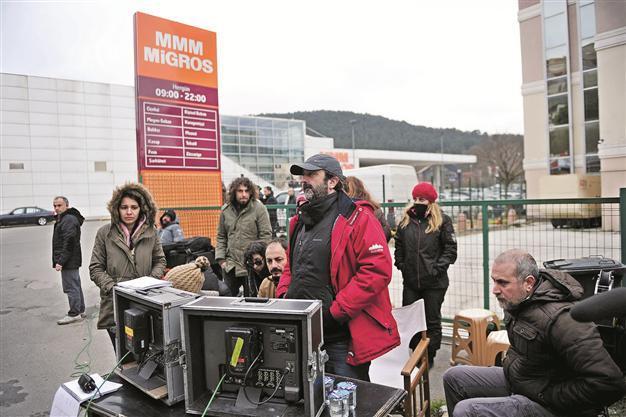Gruelling work no fairy tale on Turkey's famed soap operas
ISTANBUL - Agence France-Presse

AFP Photo
With heartthrob heroes, emancipated heroines and picturesque scenery, Turkish television drama series have taken the world by storm, gaining faithful audiences in dozens of countries across Europe, the Middle East and even the Americas.
But life on the sets of these dramas – with episodes lasting up to three hours and some series having 50 episodes - is not all glitz and glamor.
It is fraught with grueling work, with crews routinely clocking 15 to 18-hour days at the expense of their families, their health and even their lives. “The worst day I ever worked on a show was 27 hours,” young Turkish actress Elif Nur Kerkük told AFP. “It was like going back to slavery.”
Kerkük recalled how last year, after 24 hours of shooting in central Turkey, the whole crew piled onto a bus and drove to Istanbul for another day of filming without time to neither sleep nor prepare.
“I asked myself, is this it? Is this going to be my life?” she said. “But I stay in because I love it.”
A number of fatal accidents has prompted unions and actors to organize an industry-wide movement to put pressure on both production companies and the government to improve standards. Selin Erden, a 26-year-old video assistant working on the hit teen drama “Arka Sıradakiler” (Those at the Back Row), died tragically when the set’s sleep-deprived truck driver hit her during a cigarette break. In September of last year, Engin Küçüktopuz, a set worker for “Kaçak Gelinler” (Runaway Brides), died of a heart attack after working 45 hours in three days.
“In our industry, everything that your mother told you not to do when you grow up, you crumple up and throw out the window,” said Tilbe Saran, an actress and the secretary general of Turkish Actors’ Union.
The union has been keeping a list of dangerous situations since the 1980s that have arisen from eager producers pushing safety boundaries, including runaway trains, helicopter crashes and out-of-control explosions.
“Only in third-world countries do people work like this. But this is the ‘Turkish way’ of working; No supervision, no safety measures, no respect for life,” Saran said.
In January, the labor ministry classified drama sets as “dangerous” workplaces, following film industry protests with Turkey’s most famous actors and actresses as participants.
This decision means sets will now be subject to regular inspections according to its level of risk. Sets will also be required to employ safety experts and doctors. However, set workers are employed as freelancers, meaning they lack insurance; thus, production companies are not culpable for any accidents or deaths on set.
According to a 2014 report by the consultancy firm Deloitte, Turkish dramas have up to 400 million viewers in 75 countries. One incentive behind lengthier episodes is to reduce the total production cost of exporting the TV series, the report said. A Turkish TV episode lasts around 150-180 minutes including advertising time, which is long compared to Western standards.
When television watchdog the Supreme Board of Radio and Television (RTÜK) declared 20 minute minimums between ad breaks in 2004, channels began lengthening episode time to make up for lost income.
“It’s a vicious cycle; the more popular dramas get, the more famous the actors become and the longer the episodes get,” said Zafer Ayden, the head of the Turkish Cinema Workers’ Union (Sine-Sen).
Since TV series’ producers are essentially subcontractors of broadcasters, productions are also prone to being cancelled immediately. Around 50-70 TV series are launched per season and more than half are cancelled in the same season, usually due to low ratings.
“Some people lose a lot of money in this business, while others make millions. But in the end, it is blood money,” Ayden said. Last year a number of TV actors including Kenan İmirzalioğlu, star of the series “Karadayı” (The Land), were briefly detained in Istanbul on drug charges. Most of the detainees admitted to the charges, saying their exhausting schedules encouraged their drug use. İmirzalioğlu announced last month that after the finale of “Karadayi,” one of the longest-running TV shows in Turkey, he will not appear in anymore TV series until working conditions on set change and the episode length is reduced to 60 minutes.
Bracing himself for another long day on the set, Altan Dönmez, the director of the series “Şeref Meselesi,” an adaptation of the Italian drama “Onore e Rispetto” (A Matter of Respect), admitted to pushing his own crew too far.
“We cannot shoot episodes in advance because of the possibility of cancellation. In order to produce a 140-minute episode, we have to work up to 16 hours a day for six days,” Dönmez said.
“We should all ask for humane treatment of our workers,” he said, blaming TV channels wanting to air more advertisements during the shows.
